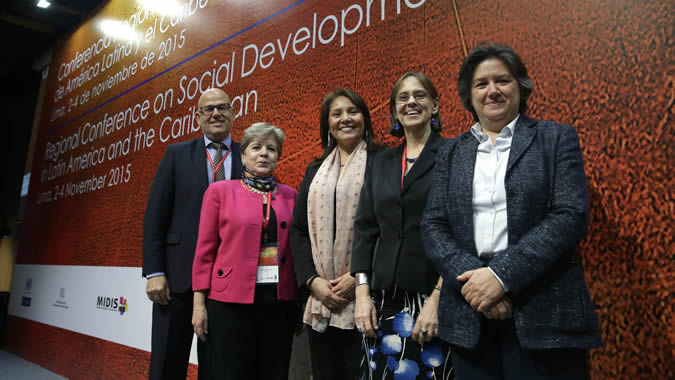Countries Highlight the Role of Multiple Policies in Eradicating Poverty and Achieving the 2030 Agenda in Latin America and the Caribbean
Work area(s)
Ministers wrap up social development meeting, jointly organized for the first time by ECLAC, the Government of Peru and UNDP.

The Regional Conference on Social Development in Latin America and the Caribbean highlighted synergies between different social and economic policies to eradicate poverty and promote the implementation of the Agenda 2030, concluded ministers participating in the inaugural meeting ending today in Lima, Peru.
"The conference has revealed the need to build intersectoral and comprehensive social policies that account for the multidimensionality of poverty, inequality and social exclusion. It is a matter of growing to equalize and equalizing to grow," said Alicia Bárcena, Executive Secretary of the United Nations Economic Commission for Latin America and the Caribbean (ECLAC), closing the three-day event.
The senior official added "we must move forward in the Agenda 2030 path, towards a new generation of policies to combat poverty and inequality, as part of a gradual structural change and sustainable economic growth: sustained and inclusive. Reducing inequality is essential to achieve a world without poverty.”
The Regional Conference on Social Development was created in 2014 as a subsidiary body of ECLAC. As a result of a strategic alliance, its first meeting was convened jointly with the United Nations Development Programme (UNDP), giving continuity to seven consecutive years Ministerial Forums for Development in the region.
"In this sustainable development era we see an increasing multidimensional approach to development policy, focused on people’s well-being, beyond living above or below the poverty line," said Jessica Faieta, UN Assistant Secretary General and UNDP Regional Director for Latin America and the Caribbean, stressing that this will be the topic of the next Regional Human Development Report.
"Education, social protection, quality jobs, all of these will be crucial to boost resilience, or the ability to absorb shocks such as natural disasters or financial crises, without falling back into poverty,” Faieta added, thanking the Dominican Republic for hosting the first meeting of the Board of the Regional Conference, to be held in the third quarter of 2016 in Santo Domingo, in the next Ministerial Forum for Development.
In the conference resolution, country delegates stress that the 2030 Agenda for Sustainable Development adopted in September at the United Nations General Assembly marks a paradigm shift and a new era for international cooperation, as well as an opportunity for countries in the region to eradicate poverty and reduce inequality for the people, for the planet, seeking prosperity for all.
Senior government officials at the meeting highlighted the ECLAC document Inclusive Social Development: A New Generation of Policies to Overcome Poverty and Inequality in Latin America and the Caribbean, and requested that it be given wide distribution, encouraging discussion and analysis in various sectors, including academia and civil society.
They also called on the Commission to update official figures systematically with three regional databases: social investment; non-contributory social protection programmes and youth and social inclusion.
"We must continue to work for human capital, focusing our efforts on people—in different periods of their life cycle: from the gestation through the first years and then ensuring access to health and education," noted Paola Bustamante, Minister Development and Social Inclusion of Peru (MIDIS).
The Minister also stressed that social policies in countries should be framed by the Sustainable Development Goals, to be achieved by 2030, promoting a development agenda to combat inequalities, to promote the empowerment of women and environmental protection.
Country representatives commended ECLAC and UNDP for jointly organizing the conference and contributing to generate synergies and complementarities and to avoid duplication of efforts. In this context, countries requested the Commission, in collaboration with UNDP, to boost cooperation between countries’ social policies and accompany them in their national efforts to develop new methodologies and tools to assess multidimensional poverty, deprivation and vulnerability.
Countries decided that the Board of the Conference will be integrated by Peru, in the Presidency, and Colombia, Ecuador, Haiti, Panama, Paraguay and Dominican Republic in the Vice-Presidency. Moreover, delegates requested that ECLAC and UNDP jointly convene the next Regional Conference on Social Development to be held in Uruguay in November 2017.
The conference's objectives is to promote the improvement of national policies for social development as well as international, regional and bilateral cooperation between offices and institutions; examine multidimensional poverty and assess other measurements, such as inequality and structural gaps in coordination with the work being done in the various subsidiary bodies of ECLAC, notably the Statistical Conference of the Americas.
It also seeks to exchange experiences in the social field and support and provide technical inputs to the Community of Latin American and Caribbean States and other regional forums; and contribute from the perspective of Latin America and the Caribbean to the discussions and proposals before the Commission for Social Development of the United Nations.
For more information:
ECLAC: María Amparo Lasso, Chief of the Public Information Unit. mariaamparo.lasso@cepal.org; cell phone: +56 9 79678306, +56 22210 2040.
Daniela Estrada, Public Information Assistant: daniela.estrada@cepal.org; cell phone: +56 9 92478224.
Follow us on: Twitter, Facebook, Flickr, YouTube and Google+.
UNDP: Carolina.azevedo@undp.org, Regional Communications Advisor, cell phone: +1 9172083732; karim.capristan@undp.org, UNDP Peru Communications Advisor, telephone: +511 625 9000, #9008.
Follow us on: regional Twitter, Twitter in Spanish and Facebook.
MIDIS: Olinda Merzthal, Chief of General Communications Office. omerzthal@midis.gob.pe; telephone: +51-1-984033195.
Pedro Hurtado, Press Coordinator of the General Communications Office: phurtado@midis.gob.pe, telephone: +51-1-631-8000 #1038 / 51-1-996432428.
Related link(s)
Country(ies)
- Latin America and the Caribbean
Contact
Public Information Unit
- prensa@cepal.org
- (56 2) 2210 2040
